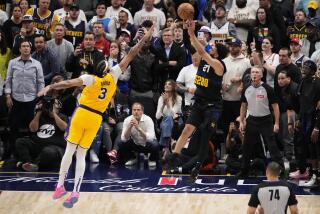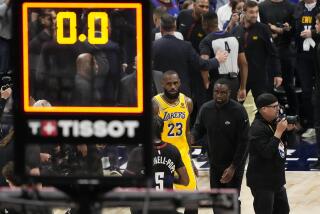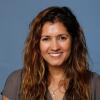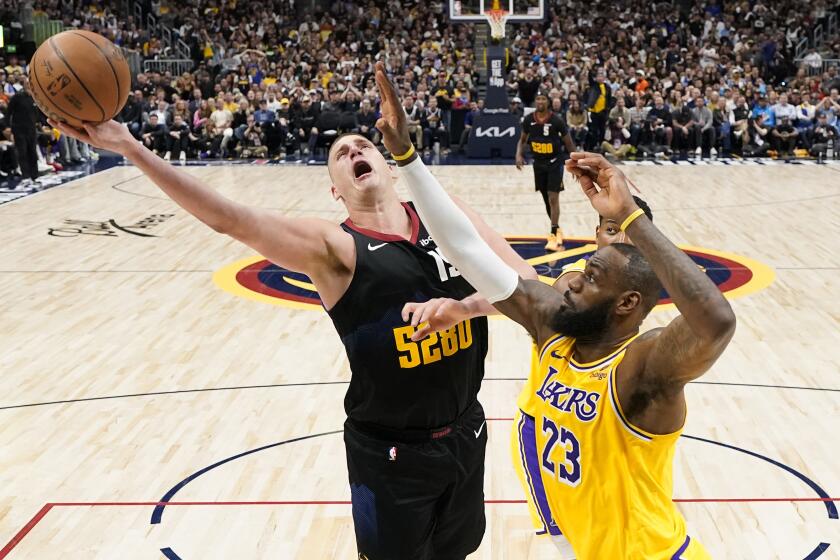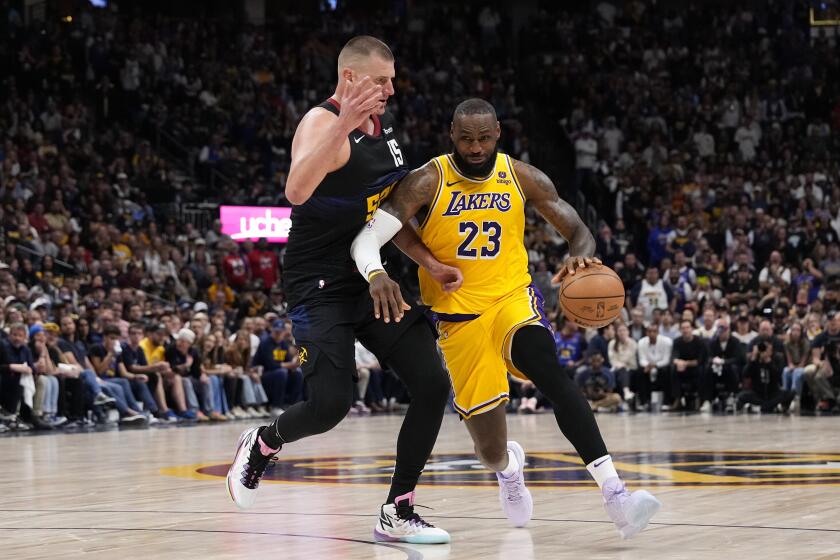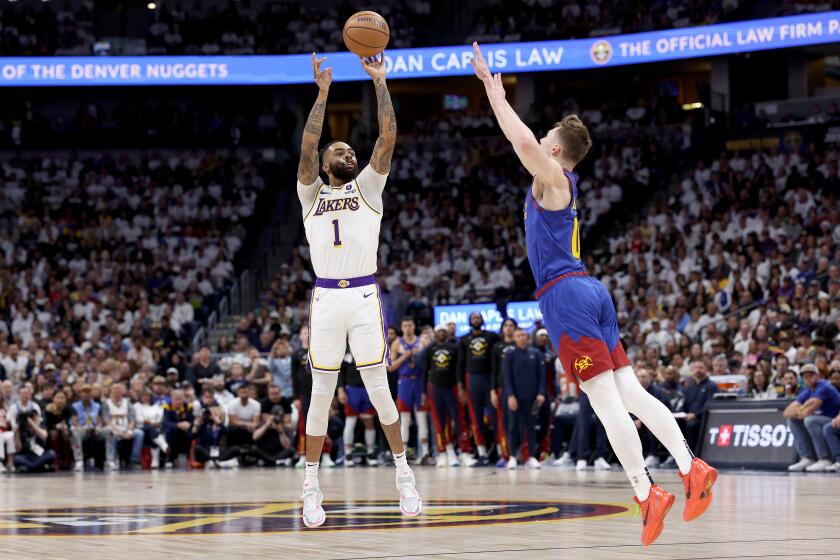Lakers keep emphasizing a defense-first approach
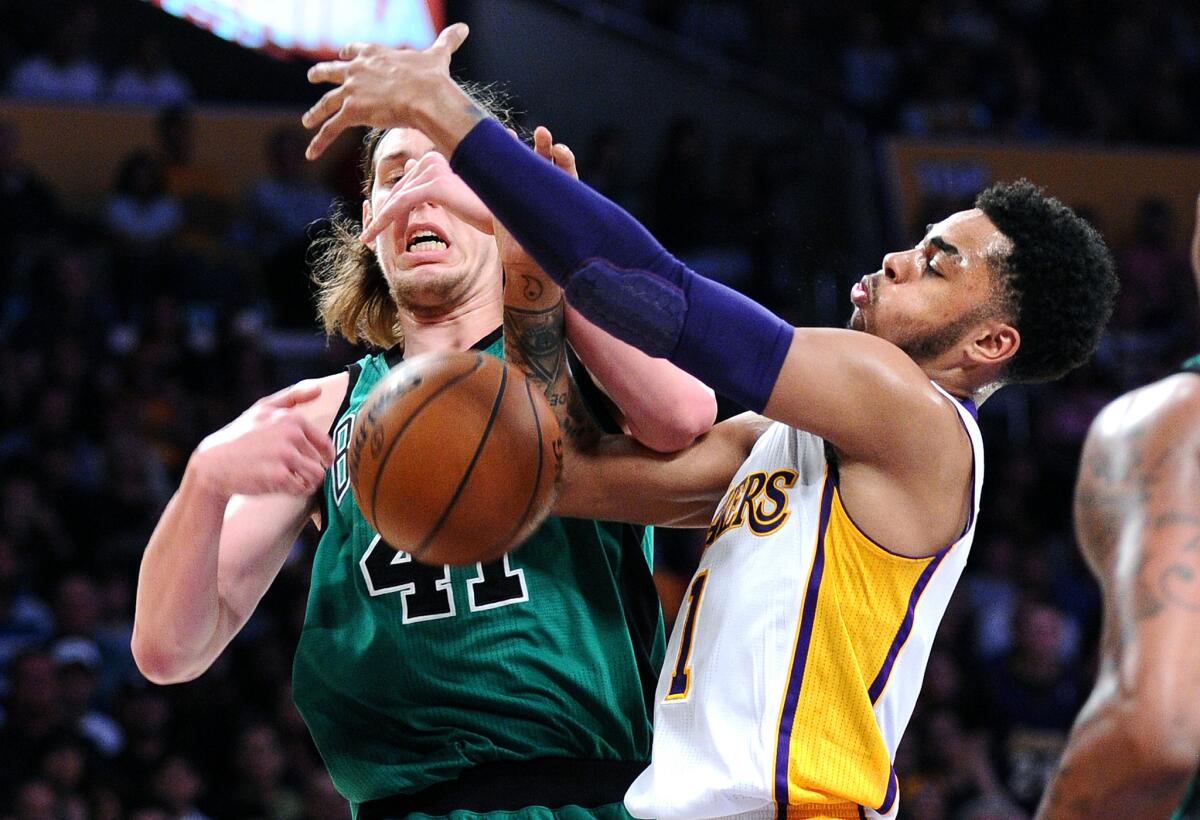
Offense is the fun part, but for most of training camp so far, Lakers Coach Luke Walton’s focus has been elsewhere.
It’s been defense, which he thinks will allow theatrics on offense.
“I think that’s where we can make a lot of progress as a team is how we get after it on defense,” Walton said. “Ultimately that will allow us to get out and run.”
Training camp opened Tuesday at UC Santa Barbara, and the first two practices focused almost solely on defense. Thursday’s morning practice included more work on offense, but didn’t neglect defense either. It’s a part of the game at which the Lakers struggled last season.
“Kind of got to a point where it was bad,” guard Jordan Clarkson said. “We were a bad defensive team on the whole last year.”
The Lakers’ defensive rating was the worst in the NBA, allowing 109.3 points for every 100 possessions. Opponents made 46.7% of their shots against the Lakers, the third-highest percentage in the NBA. They allowed more fastbreak points than all but one team and more second-chance points than all but two teams last season.
“It’s really important to etch that in our heads early in terms of those defensive details in terms of closing out, bumping guys early, tagging, cutters, getting over and trapping the block, rotating, the movement of the ball,” Clarkson said. “A lot of that comes in when you play, when the season starts and even in the preseason.”
Walton has liked the effort from his players. Rookie Brandon Ingram was a defensive bright spot Wednesday night, when the Lakers held their first scrimmage of training camp.
“He’s starting to really understand how to use his length in fighting over screens and contesting jump shots and making people miss,” Walton said. “That was the most impressive part of his game, was his defense.”
As Walton tries to get his team to bond with one another this fall, that message resonates on defense.
“Playing for each other on the defensive end,” point guard D’Angelo Russell said, when asked what he’s learned defensively this week. “Knowing that there’s five guys. The more stops we get the more we can get out and run and be as exciting as we want to be on the offensive end.”
Veteran counsel
Lakers guard Lou Williams tries to strike a balance in his mentorship role with Clarkson and Russell.
“Just trying to help whenever I can and at the same time giving these guys the space to create their own opportunities to be leaders,” Williams said. “Obviously it’s going to be D’Angelo and Jordan’s show. They’re expecting those guys to run it. You don’t want to be overbearing. You want to give them the best advice you can. Lead by example. At the same time leave the door open for them to try to build the same type of thing.”
Russell is entering his second NBA season, Clarkson is entering his third NBA season.
Coaxing leadership out of Russell has been a focus of Walton’s this summer. He said he believes Russell has the ability to be a leader and has seen signs of it already. He’s also been impressed with Williams taking a vocal role.
“I think they understand it’s time to go,” Williams said. “You can’t hide behind the young-guy tag forever. There’s a lot of young guys around the league making noise; they want to be a couple of those guys.”
Etc.
Although the Lakers aren’t expecting Metta World Peace, 36, to make their opening-day roster, they expect his presence, however long it lasts, to help the mostly young team.
“We know worst-case scenario for the next 28 days he’s going to be a huge asset for the team,” General Manager Mitch Kupchak said. “If he goes the 28 days of camp and we decide not to keep him, those 28 days are going to pay huge dividends for this organization.”
World Peace aims to lead by example.
“It’s all about being competitive,” he said. “You teach while you play on the court. So when you’re on the court, you’re real competitive and they get better from that.”
Twitter: @taniaganguli
More to Read
All things Lakers, all the time.
Get all the Lakers news you need in Dan Woike's weekly newsletter.
You may occasionally receive promotional content from the Los Angeles Times.
